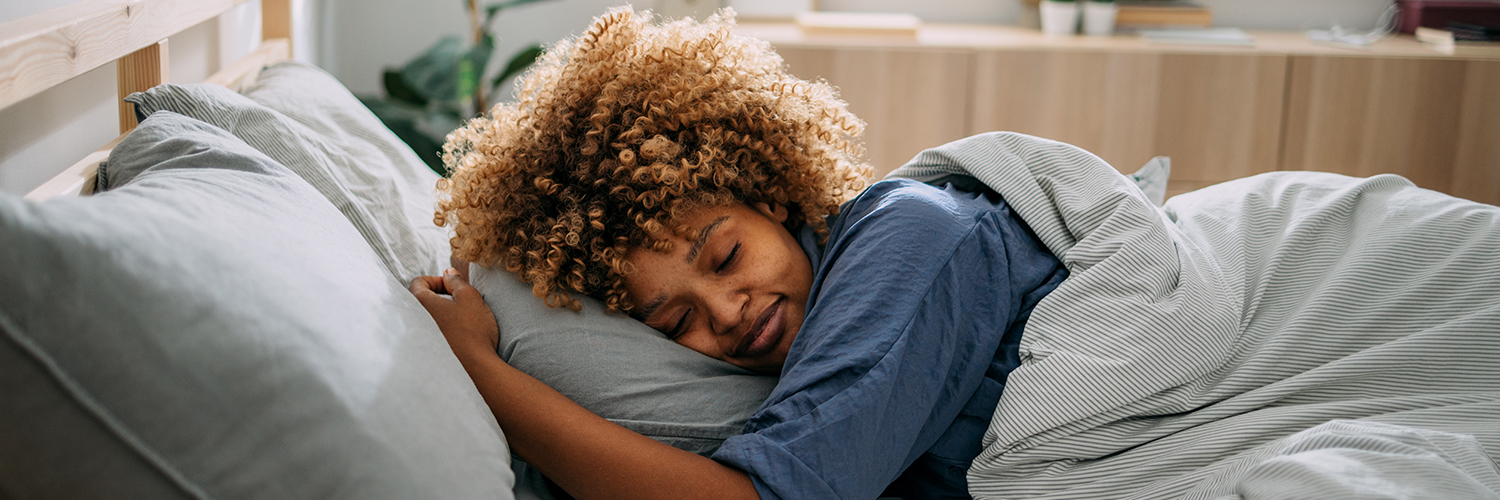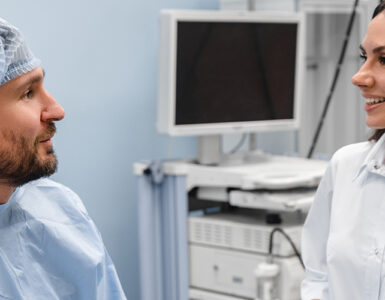Sleep is an essential biological process that’s a reversible state of reduced responsiveness and motor activity. Sleep supports our overall health in many ways. Among the various stages of sleep, deep sleep and REM sleep are particularly important for our well-being due to their restorative functions.
For example, deep sleep (also known as slow-wave sleep) is crucial for physical recovery, immune function and brain health, while REM sleep supports many aspects of mental and emotional processing.
Deep Sleep vs. REM Sleep: Are They the Same?
Throughout the night, your body cycles through four sleep cycles. Each cycle is 80 to 100 minutes and consists of non-REM sleep stages and REM sleep.
Deep sleep and REM sleep stages are both critical parts of restorative rest, but they serve different purposes in the sleep cycle.
Deep Sleep (Non-REM Stage 3 Sleep)
This is the most restorative stage of sleep and crucial for physical recovery and growth. During deep sleep, the body repairs tissues, builds bone and muscle, and strengthens the immune system.
Here are some key facts about deep sleep:
- Deep sleep occurs after the first two stages of sleep (NREM stage 1 and stage 2)
- Brain waves are slow (delta waves) in this stage, and it’s difficult to wake someone up
- It’s during deep sleep that the body builds up energy for the next day and carries out many restorative processes that keep the body resilient
- Hormones needed for growth and appetite regulation are released during this stage
- Young people typically spend more time in deep sleep than older people
REM Sleep
REM sleep, which stands for rapid eye movement sleep, is vital for cognitive functions such as memory, learning and emotional processing. REM sleep is also when most dreaming occurs, and it is thought to support brain development and emotional health.
Here are some key facts about REM sleep:
- This stage typically occurs about 90 minutes after falling asleep
- REM sleep periods get longer through the night, with the longest periods occurring in the morning hours
- Eyes move rapidly from side to side behind closed eyelids, associated with vivid dreams
- Brain wave activity becomes closer to that seen in wakefulness
- It plays a key role in memory consolidation and mood regulation
General Sleep Requirements for Adults
For most adults, the recommended amount of sleep is between 7 and 8 hours each night.
Adults should aim to achieve about 20 percent of their sleep in the deep stage, which equates to approximately 60-100 minutes of deep sleep during an 8-hour night.
Ensuring a sufficient amount of deep sleep is essential for feeling rested and remaining healthy—as it helps to rejuvenate the body and supports functions ranging from metabolism to mood regulation.
Sleep Needs for Women vs. Men
The debate over whether women need more sleep than men is ongoing, with some research suggesting slight differences.
According to the National Sleep Foundation, research indicates that women may require more sleep than men due to hormonal reasons, and greater mental and emotional exertion during the day, which leads to a greater need for recovery during sleep.
Women tend to fall asleep faster and spend more time in deep sleep than men—suggesting a greater need for rejuvenating rest.
However, the difference between men’s and women’s sleep needs is typically small (women, on average, only sleep for about 11 to 14 minutes longer than men). Sleep needs also vary from person to person based on factors like age, lifestyle, stress and health status.
Overall, both women and men should aim to get at least 7 hours or more of sleep most nights.
The Negative Impact of Sleep Deprivation
More than 35 percent of U.S. adults report sleeping fewer than seven hours daily.
Adults who sleep less than 7 hours per night are more likely to deal with various health issues due to how sleep deprivation impacts hormones, neurotransmitters (brain chemicals) and many other processes. Failing to get enough sleep, especially deep sleep, can have profound implications for both physical and mental health.
Short-term effects of being sleep deprived can include:
- Reduced cognitive function, such as poor memory, learning and decision-making
- Irritability
- Increased stress responsiveness
- Increased appetite and cravings
Long-term sleep deprivation can potentially contribute to serious health problems, such as:
- Higher risk of heart disease and diabetes
- Greater risk for weight gain or obesity
- Worsened mental health disorders, such as depression and anxiety
Tips for Optimizing Sleep for Better Health
To promote better sleep, try the following tips:
- Get regular exercise and sunlight exposure during the day time
- Maintain a regular sleep schedule by going to bed and waking up at about the same time every day
- Create a bedtime routine that is relaxing, like reading or taking a bath/shower
- Ensure your bedroom is quiet, dark and cool, with a comfortable mattress and white noise
- Limit exposure to blue light from screens before bed, including from phones, tablets, TVs and computers
- Avoid large meals, caffeine and alcohol before bedtime
At Stony Brook Sleep Disorders Center, specialists are dedicated to diagnosing and treating sleep disorders using state-of-the-art technology and personalized care plans. Recognizing the unique needs of each patient, they provide targeted treatments to improve sleep quality and address conditions such as sleep apnea, insomnia, and more.












